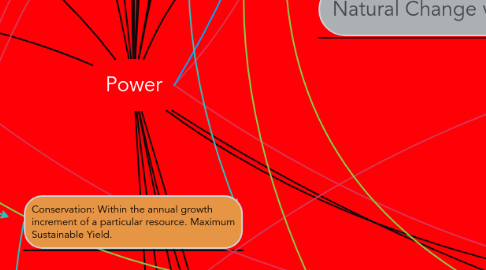
1. Food Secuirity
1.1. Access to enough food for a healthy and active lifestyle
2. Rostow's Stages of Economic Growth
2.1. 1) Traditional society: Limited technology; Static society.
2.2. 2) Preconditions for take-off: Commercial exploitation of agriculture and extraction industry
2.2.1. Transition triggered by external influence, interests, or markets.
2.3. 3) Take-off: Development of a manufacturing sector
2.3.1. Installation of physical infrastructure and emergence of social/political elite
2.4. 4) Drive to Maturity: Development of wider industrial and commercial base
2.4.1. Investment in manufacturing exceeds 10% of national income; development of modern social, economic, and political insttutions.
2.5. 5) High mass consumption
2.5.1. Exploitation of comparative advantages in international trade.
3. Big push to industrialize agriculture and to build infrastructure such as dams and roads.
3.1. Big infrastructure investments could jump start an economy and put it on the path to industrialization.
4. A questioning of modernization in an era of decolnization
5. Post World War II North American and European Optimism
5.1. Belief in the ability of modern technology to solve humanity's problems.
5.1.1. DDT: Used to kill off insects, mosquitoes, high use in american agriculture and pest control in urban areas. Consequences: Pesticides bioaccumulate in animals and destroy food chains, thus ecosystems. (Rachel Carson, "Silent Spring")
6. Human management of renewable resources
7. Environmentalism: A response to over-exploitation and urbanization
8. Displacement of humans
8.1. Areas Become Subsidized
9. Conservation: Within the annual growth increment of a particular resource. Maximum Sustainable Yield.
10. Exploitation: Use of a resource without regard for its long-term productivity.
11. Human Geography: Examination of human or social phenomena.
12. Human-Env. Geog: Studying interactions and interelationships of human activity, modification of landscapes, and environmental influences. An emphasis on the role of humans in changing the face of the earth and how, in-turn, this changed environment may influence humans.
13. Sustainable Development
13.1. Development that meets the needs of the present without compromising the ability of future generations to meet their own needs.
14. Social Construction of Nature
14.1. Nature or the environment is constructed mentally by humans and human concepts of nature are culturally, temporally, and politically changing.
14.2. "Socionature"
15. Cultural Ecology
16. Glabalization!
17. John Muir (Preservationist): First president of the Sierra Club, Believes nature is a place without humans where wilderness is defined as a place "where man himself is a visitor who does not remain."
18. Resources flow from a "periphery" of poor and underdeveloped states to a "core" of wealthy states, enriching the latter at the expense of the former.
18.1. World Systems Theory
19. Production of food through locally controlled and accessible systems
20. Producing enough food in the country to meet daily calorie needs of populace
21. Food Self-Sufficiency
22. Food Soveriegnty
23. Development
24. Natural Hazards
25. Equity
25.1. Geographic Equity: location and spatial configuration of communities, including their proximity to environmental hazards and sources of pollution.
25.2. Procedural Equity: fairness in the extent that government rules, regulations, evaluation criteria, and enforcement are applied in a nondiscriminatory way.
25.3. Social Equity: the role of social and economic factors such as race, ethnicsity, gender, class, culture, and political power in decision making about environmental issues.
26. Environmental Racism and Justice
27. Dependency Theory
28. Study small-scale Global South communities
28.1. Cultural Ecologists set out to study these systems on their own merits, often revealing that these approaches were ecologically and economically rational.
28.2. Cultural Ecologists were not afraid to question so-called modern practices to determine if these really represented an advancement over practices developed locally
29. Natural Change vs Anthropogenic Change
30. Biomes
31. Climate: average condition of the weather over a long period of time
32. Weather: short-term change in moisture and air movement
33. 23.5 degree Tilt of The Earth causes Earth's seasons
33.1. Causes Differential heating of the Earth's Surface
33.1.1. Causes air pressure and temperature differences
34. Colonialization
35. Ecocentric Perspective
35.1. Non-human nature not only matters, but organisms are agents of change, change humans, and deserve consideration and special focus
35.2. "Post-Humanism"
36. Gifford Pinchot (Conservationist): Founded the US Forest Service, saw the wise use of natural resources as the key to sustainable development and production over time
37. Preservation: Non-consumptive use i.e Wilderness Areas and Parks.
38. Environment (Physical) Geography: Study of biophysical phenomena.
38.1. Hydrosphere:water in all its forms
38.2. Atmosphere: gaseous layer that surrounds the Earth
38.3. Lithosphere: platform of the life layer
38.4. Biosphere: encompasses all living organisms on Earth
39. Scale
39.1. Local
39.2. Regional
39.3. Global
40. Social Darwinism: Racist view on humanity; the superiority of dominant European groups at the expense of subject populations around the world.
41. AgriSystems
41.1. Themes of Cultural Ecology
41.1.1. 1) Society and Nature are intimately connected
41.1.2. 2) Cultural Behavior is considered in its Functional role
41.1.3. 3) Population dynamics influence in food production
41.2. Global North
41.2.1. Political Ecology
41.2.1.1. Situate these local-level dynamics from Cultural ecology in a broader scale of national, regional,, and international forces.
41.2.2. Commercial: Family and corporate farms
41.2.2.1. monocultural
41.2.2.1.1. Uses Fossil fuels, GMOs, Water, Fertilizers, Pesticides, Insecticides
41.2.2.1.2. Modernization Theory
41.3. Global South
41.3.1. Subsistence
41.3.1.1. polycultural
41.3.1.1.1. Agroforestry: mixing crops and trees
41.3.2. Green Revolution
41.3.2.1. Mixed: Industrial & Traditional Systems
41.3.2.2. Agricultural Dual Economy
41.3.2.3. Agricultural Dual Economy
41.3.2.4. Urban Agriculture Japan, Singapore

